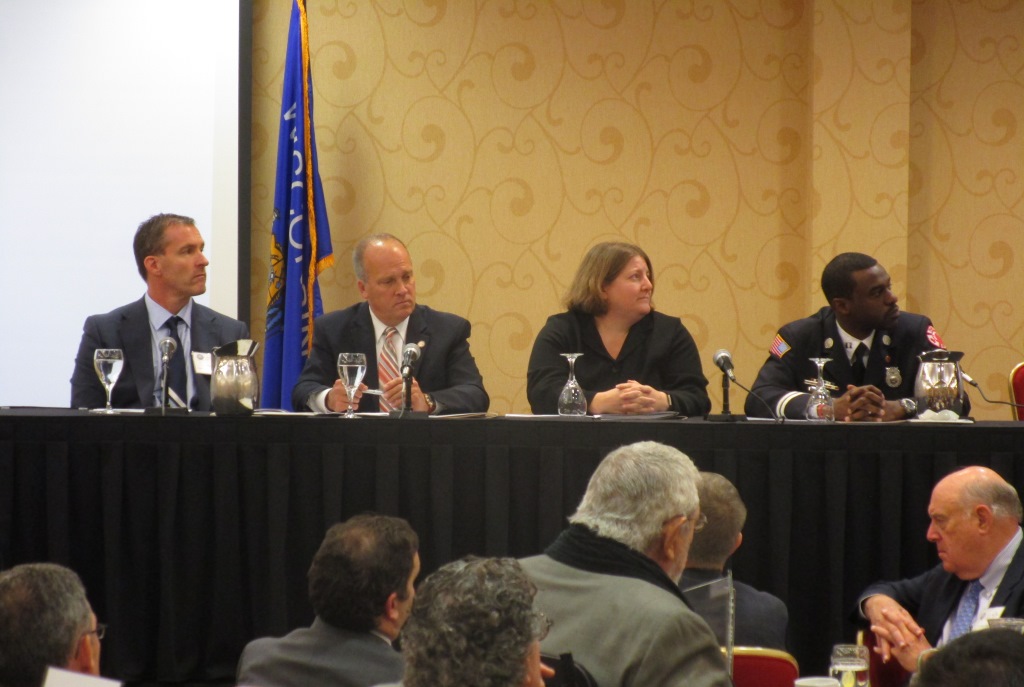Opioid Crisis Still Growing
Are there solutions? Panel of experts share views on epidemic of overdoses, deaths.

Timothy Westlake, emergency medical physician with ProHealth Care; Brad Schimel, Wisconsin attorney general; E. Brooke Lerner, associate professor of emergency medicine at the Medical College of Wisconsin; and Joshua Parish, Milwaukee Fire Department captain. Photo by Dave Fidlin.
Across Wisconsin, an estimated 163,000 persons are currently abusing some form of an opioid drug.
This was one in a series of eye-opening statistics that shed new light on the ongoing crisis surrounding fentanyl, heroin, methadone, oxycodone and other drugs in this class of addictive painkillers, and the focus of a forum Friday.
The Milwaukee Regional Research Forum, an organization that partners with eight medical and higher education institutions, hosted the forum — its eighth annual — in an effort to continue a dialogue toward meaningful solutions to an ongoing problem.
“This has everybody’s attention,” said Rob Henken, president of the Public Policy Forum, who moderated the panel discussion. “It does seem to have everybody worked up. But are we there?”
According to the Milwaukee County Medical Examiner’s office, 294 opioid-related overdose deaths occurred in the city and surrounding 18 suburbs in 2016 — more than double the 144 deaths reported in 2012.
At the forum, Timothy Westlake, an emergency medicine physician with ProHealth Care, said the state of rising overdoses today stem from “a perfect storm” that can be traced back two decades.
In the late 1990s, Westlake said, a movement in the medical community led to prescribing more pain-relieving drugs. The argument, he said, was some conditions were going untreated.
“That’s what led to the problem,” said Westlake, who was the keynote speaker and one of four panelists offering varied viewpoints on the epidemic. “Powerful opioids were being prescribed for chronic pain.”
Attached to that scenario are stigmas as dependence grows, Westlake said. “Addiction is a disease that hides and grows in the dark,” he said. “We have a cultural pill bias.”
Few would contend there isn’t a problem with opioid overdoses and addiction. But steps toward seeking solutions have not always been popular.
Wisconsin Attorney General Brad Schimel, another panelist at the forum, concedes his stance on the epidemic has been controversial in some circles. But he said he is unwavering in his approach.
“We will not arrest our way out of this problem,” Schimel said. “We also will not incarcerate our way out of this problem.”
The strictly law-and-order approach of the past has not proven effective, Schimel said, as evidenced by the ongoing rise in overdoses and deaths.
“We’ve suffered from the Albert Einstein definition of insanity,” Schimel said. “We’ve been doing the same thing over and over again and expecting a different result. If we’re going to beat this, it has to be a multi-faceted approach.”
Using the composition of the panel seated at Friday’s forum as an example, E. Brooke Lerner, associate professor of emergency medicine at the Medical College of Wisconsin, said true collaboration is a key to eradicating the problem.
“We need to bring together groups that might seem strange to have together,” Lerner said.
Public awareness campaigns can be effective and enter into the cultural conscience over time, Lerner said, pointing to smoking cessation messages as one potent example.
“There are some lessons there that we have to try and apply to this problem,” she said.
While awareness and other conceptual issues are one end of the spectrum, there also is the practical side of treatment.
Joshua Parish, a Milwaukee Fire Department captain, said it is imperative that EMS responders have the proper equipment and resources so overdose patients have a fighting chance.
“Our primary goal is to reduce the mortality rate,” Parish said, matter-of-factly.
While the panelists dug deep into the issues surrounding the problem, Westlake said there is one obvious first step each person struggling with addiction has to take — he or she has to want to seek solutions.
“Forced treatment does not work,” Westlake said.
And while there have been plenty of headlines about opioid overdoses and deaths, and the issue has become part of the public conscience, Schimel said he believes more work is still needed to get the word out about how serious the problem truly is — in urban areas, suburbs and rural communities.
“I’ve never been comfortable calling this a war on drugs,” Schimel said. “It is a battle to win over public opinion.”
More about the Opioid Crisis
- Attorney General Kaul Announces Consent Judgment with Kroger Over Opioid Crisis - Wisconsin Department of Justice - Mar 21st, 2025
- Baldwin Votes to Strengthen Penalties, Step Up Enforcement Around Deadly Fentanyl - U.S. Sen. Tammy Baldwin - Mar 17th, 2025
- Wisconsin Communities Get Millions From Opioid Settlement as Deaths Decline - Evan Casey - Mar 1st, 2025
- MKE County: County Creates Easy Public Access To Overdose Data - Graham Kilmer - Feb 18th, 2025
- Milwaukee County Executive David Crowley and the Office of Emergency Management Launch New Overdose Dashboard - County Executive David Crowley - Feb 18th, 2025
- Fitzgerald Advances Legislation to Fight Opioid Epidemic - U.S. Rep. Scott Fitzgerald - Feb 6th, 2025
- Milwaukee Is Losing a Generation of Black Men To Drug Crisis - Edgar Mendez and Devin Blake - Jan 31st, 2025
- Milwaukee County’s Overdose Deaths Declined For Second Straight Year - Evan Casey - Jan 27th, 2025
- MKE County: United Community Center Awarded Drug Company Money For Addiction Treatment - Graham Kilmer - Jan 12th, 2025
- DHS Provides Update on Distribution of Latest Opioid Settlement Funds - Wisconsin Department of Health Services - Jan 9th, 2025
Read more about Opioid Crisis here




















The effort needs more people with lived experience that have survived and healed their addiction guiding the process to the solutions. They have the answers, having lived through it. More politicians, bureaucrats, and policy wonks keep us stuck in a cycle of dysfunctional rescues.
yes Dr. Addiction is the only disease where the person has to want to get better. Thats what peers do that these panels can’t do. They offer real hope that life can be better because they have done it.
“He only had a dollar to live on ‘til next Monday, but he spends it all on comfort for his mind. Did you say you think he’s blind?” – Steppenwolf. “Life: Loathe or ignore it, but you can’t like it.” – Marvin. Shakespeare wrote a play on the opioid crisis. It’s called “Romeo and Juliet.” Only in the play, Romeo and Juliet know each other.
For a very eye-opening account of how this crisis began, look at the October 30 issue of The New Yorker magazine with an enlightening and well-researched article by Patrick Radden Keefe. The collusion between government and moneyed, special interest individuals and lobbyists is appalling. This is a national tragedy that’s already growing internationally. And maybe the Sackler Family who own Purdue Pharma might be convinced to admit to their role in this and address it with some billions of dollars for rectifying it.
This issue seems to only be getting addressed by blacklisting opiate pain meds. These drugs have been proven effective and are legal (and in many cases have no “safe” alternatives), but because heroin and fentanyl are killing people, doctors are being encouraged to stop prescribing them.
Where’s the effort to go after the ILLEGAL opiates? I have yet to hear how they are being addressed. Is it because the only way to claim any sort of victory is to go after the legal prescription drugs rather than the ones actually killing people?
Don’t let this is a terrible crisis be an excuse for medical practitioners to lose their compassion and adherence to the Hippocratic oath: Cause no pain. Doctors should keep prescribing pain medication for post-surgery patients for three to five days or as needed. Don’t make everyone suffer because of this problem. Telling patients that aspirin or Tylenol will relieve their surgery pain is cruel and dishonest.